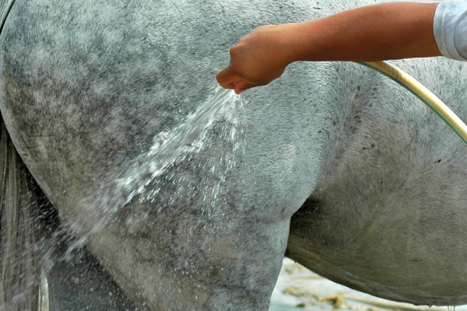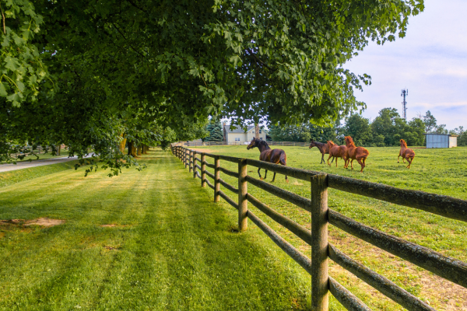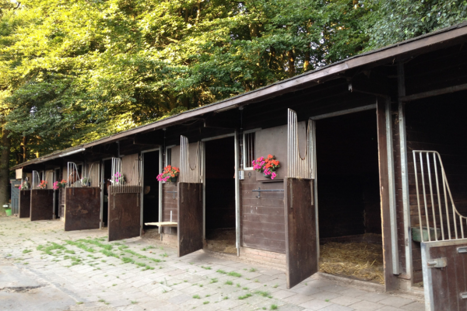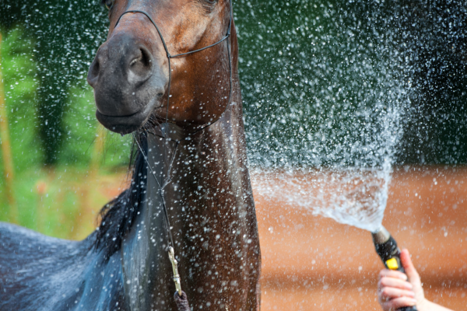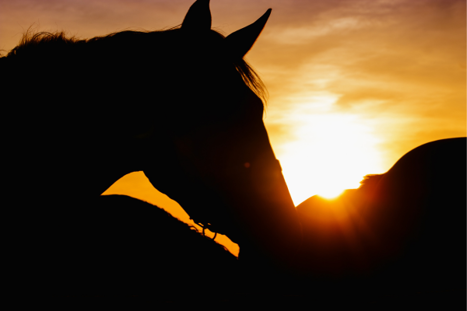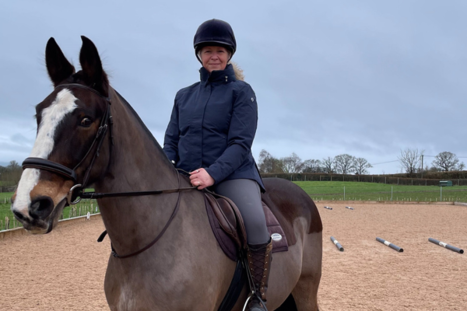
Expert Cooling Tips For Horses In Hot Weather
We asked an award-winning professional groom for their tips on keeping your horse cool in hot weather at home and away at competitions, Here's what they said....
Equetech | July 03 2025Looking for some expert cooling tips for your horse at home or away at shows? We asked our Brand Champion and award-winning international groom, Emma Cornish, for her top tips and advice on keeping your horse healthy, happy, and safe during hot weather.
Cooling Tips For Horses At Home
Keeping your horse cool at home is easy with Emma's tips and advice. From turnout tips to practical advice, Emma explains how to create a cool environment for your horse in hot weather.
Water Water
"Ensure there is a plentiful supply of fresh, clean water available at all times. A 500kg horse can drink on average 3-4 buckets of water a day; in hot weather, this could increase by 50%. Lack of access to fresh drinking water can cause dehydration and also affect the digestive system, increasing the risk of colic, so don't take chances."
Turnout Tips In Hot Temperatures
"If you plan to turn your horse out, make sure there is enough shade for all horses throughout the day to shelter from the direct sun if they choose to. Ensure fly spray, fly rugs, boots, and masks are used to protect against flies as required, but check that your horse's rug doesn't make them too hot. On especially hot summer days, it might be kinder to leave the rug off and apply fly spray diligently. Don't forget to apply Sunscreen (factor 50) to protect from harmful sunburn on sensitive pink skin."
Stabling In Hot Temperatures
If horses are stabled during the hottest part of the day, Emma recommends ensuring it is cool.
"Some wooden stables are actually hotter than the outside air temperature in the midday sun"
"Make sure there is good airflow/ventilation through the stables and a plentiful supply of fresh, clean water and a salt lick is available."
Riding In Hot Weather
"If exercising is part of your daily routine, ride early in the morning or later in the evening to avoid the hottest part of the day. Ride for shorter periods and keep faster work to a minimum. Make sure your horse is thoroughly cooled down after working by continually hosing down the whole body with cool/cold water until the water runs off cold, this can take up to 10-15 minutes. Allow the water to run off freely; do not scrape it off. Scraping has been scientifically proven to inhibit the cooling process, not speed it up. "
Sweat & Salt
Emma recommends you feed electrolytes, as she explains;
"Feeding electrolytes during hot weather, or when horses have been working at a medium or hard level and sweating excessively, will help restore essential salts and minerals which are naturally lost through the sweating process. A significant loss of electrolytes can cause dehydration, impact on performance and potentially azorturia", warns Emma.
Beware!
Some horses can develop a condition called Anhidrosis. This is where the horse has a reduced or complete inability to sweat, thus impacting their ability to regulate body temperature. Signs to watch out for include reduced or absent sweating, intolerance to exercise, delayed recovery, increased respiratory rate, lethargy, poor performance, and dry, flaky skin.
Cooling Tips For Horses Away From Home
Competing during the summer months can bring its own unique challenges. Award-winning groom Emma Cornish shares her tips for keeping your horse cool and comfortable travelling and out at summer events.
"It's always best to be prepared and have all your own bases covered", advises Emma.
"Horse welfare must always come first, and ultimately that is the responsibility of the rider. So, whether you're attending a one-day Pony Club rally or a three-day international event, you should always take everything with you and not assume that a full suite of facilities will be available. Pack your lorry for every eventuality, especially in the UK, where the weather can be so changeable."
Expert Cooling Travel Tips
"Whether you are competing for the day or the weekend and the temperature is forecast to rise, travel your horse at the coolest time of the day; early morning and evening time, wherever possible. Always make sure you have a plentiful supply of water on board your lorry or trailer and allow for traffic delays, especially if you need to cool your horse off. At the same time, you're stuck in traffic, your water supply will soon diminish, so always take extra onboard."
Aircon On The Move
"Open air vents or windows at a safe opening to encourage airflow whilst travelling. Fit fans in the back of your horse box to circulate the airflow, these can be purchased from most online retailers and will offer some welcome relief from the warmth."
Show Ground Arrival Tips
"When you arrive at the event, if there is the opportunity to park in the shade, do so. Alternatively, look where the sun is on arrival and park so your horse will have the shade of the lorry later on in the day."
"Familiarise yourself with the location of the water points and taps at the event. Make sure you know how and where to locate the on-site vet or stable manager, should an emergency arise."
Drink Up To Keep Cool
"At the event, ensure water is always available for your horse to drink. You should offer water to your horse at all times, whether you are working your horse or at rest. You can put small ice blocks/cubes or similar into their water bucket to keep their water cool. You don't want to make their water icy, just to keep it cool and refreshing. Add apple juice to their water or make a sloppy soup with pony nuts and electrolytes, to add extra hydration to their water consumption away from home."
Keep It Short And Sweet
"When warming up in hotter temperatures, warm up in shorter blocks, for example, if you normally warm up for 30 minutes, try 15 minutes, then have a break and offer your horse a drink, cool/sponge down, walk in the shade, then another shorter 10-minute warm up."
Shady Moves
"Just like your lorry parking, remember to take full advantage of any shade around the show ring and stables area. There can be a dramatic difference in temperature range between full sun and shade."
Water Wonderland
"Don't forget, you can wash/cool down your horse at any point during your warm-up and before entering the arena. It does not have to happen just at the end of your test. "Emma recommends you also thoroughly soak your horse with cold water several times a day to cool them down, adding;
"Don't scrape off the water, but let it evaporate naturally, as this will keep your horse cool for longer."
You can also soak their fly rug in a cool bucket of water before putting it on them.
"Again, this will aid in keeping them cool while at home or away at an event."
Expert Rider Cooling Tips
"Don't forget about yourself, too!" Emphasises Emma.
"Always carry a bottle of water with you, make sure you're always well hydrated. Wearing hats keeps the direct sun off your head. Sunglasses are a must; the glare of the bright sun can make you squint and cause headaches. Keep cool by wearing light-coloured, loose-fitting clothing. Don't forget your sun cream too! When applying sun cream to your horse's sensitive skin, ensure you've applied yours first. Make use of the innovative products like the new Equetech Pulse Ice Bands, which will make you feel cool and fresh in the hottest of heatwaves."
Is your horse too hot? Here is Emma's 8-point checklist;
- Does he feel hot to the touch?
- Is he breathing fast and shallow (panting) or deep and laboured?
- Is he sweating excessively or entirely covered in sweat?
- Is he withdrawn and non-reactive to his surroundings?
- Does he appear distressed?
- Does he have a high rectal temperature reading?
- Are his prominent raised veins under his skin?
- Is he unsteady on his legs - ataxic?
Immediate aggressive cooling with cold water is required for any of the above signs, but please consult your veterinary surgeon if your horse shows ANY OF THE ABOVE SIGNS or you have any concerns. Extreme heat stroke & exhaustion can be fatal.
Final Thoughts? If it's too hot for you, it's likely to be too hot for your horse. If you can afford to give your horse a few days off in a UK heatwave, then do so. Remember, just like humans, some younger, sick, or elderly horses may struggle to cope with a sudden increase in temperature. So, be sensible and do the best thing for your horse.
About Emma:
Emma is the founder of Elite EquineCare and the co-founder of The Ice Queens, who have a wealth of expertise in equine cooling and heat mitigation solutions, having attended numerous national and international events for several years now, including the World Equestrian Games 2022 in Rome, European Championships in France in 2023, Pau 5* 2023 and Paris Olympics 2024.
